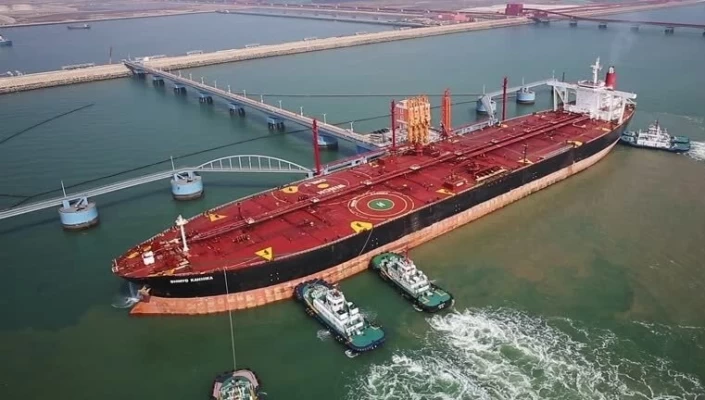Sea transportation in Fujairah port
Fujairah Port, located on the eastern coast of the United Arab Emirates (UAE), stands as a pivotal maritime gateway in the region. Established in 1983, this port plays a crucial role in maritime transport and logistics, capitalizing on its strategic position near the Strait of Hormuz—one of the world’s busiest maritime passages. This article explores the significance of Fujairah Port in maritime transport, its infrastructure, economic impact, challenges, and future prospects.
Geographical Significance
Fujairah Port is strategically located along the Gulf of Oman, providing direct access to the Indian Ocean. This geographical advantage allows it to serve as an alternative route for vessels wishing to bypass the congested Strait of Hormuz. The port's location has made it a critical hub for maritime traffic, particularly for oil tankers and bulk carriers.
The port's proximity to major shipping routes enhances its attractiveness as a transshipment point for cargo vessels. Fujairah Port offers shipping companies a reliable option for refueling, maintenance, and cargo transfer, significantly boosting its operational capacity and global trade appeal.
Port Infrastructure
Fujairah Port boasts modern infrastructure designed to accommodate a wide range of maritime activities. The port features several deep-water berths capable of handling various vessels, including container ships, bulk carriers, and oil tankers. With a draft depth of up to 16 meters, Fujairah Port can accommodate larger vessels that may not be serviced by other ports in the region.
In addition to berthing facilities, Fujairah Port is equipped with extensive cargo handling capabilities, including container terminals, general cargo handling facilities, and dedicated oil storage tanks. These advanced logistics and storage facilities support the efficient management and distribution of cargo. The port is well-prepared to handle both liquid and dry bulk cargo, enhancing its operational versatility.
Economic Impact
Fujairah Port plays a vital role in the UAE's economy, facilitating trade and commerce and contributing to the diversification of the country's economic landscape beyond oil. The port acts as a key point for the import and export of goods, significantly boosting the regional and national economy.
Fujairah has become a popular choice for oil-related operations, particularly given its proximity to oil-producing regions. The port manages substantial volumes of crude oil, petroleum products, and liquefied natural gas (LNG), establishing itself as a crucial center for the energy sector. The presence of numerous shipping companies and service centers at the port fosters competition and economic development in the region.
Challenges and Opportunities
Despite its successes, Fujairah Port faces several challenges. One of the primary concerns is the need for further infrastructure development. With rising trade volumes, the port is approaching its capacity limits and may struggle to meet demand without additional investment. Furthermore, modernizing port operations with new technologies, such as automated loading systems and real-time tracking, can enhance efficiency but requires significant financial investment.
Environmental sustainability is another critical challenge. Like many coastal areas, Fujairah Port must manage the environmental impacts of maritime traffic. Initiatives such as waste management, water pollution control, and sustainable development practices are essential to ensure that port growth does not adversely affect the environment.
However, there are numerous opportunities for Fujairah Port. Expanding facilities and improving infrastructure can make it a more attractive option for international shipping companies seeking alternative routes to avoid congested ports. Collaboration with other Gulf ports can strengthen its position within regional trade networks. Additionally, given its strategic location and integration of green technologies, Fujairah Port can serve as a model for sustainable maritime transport in the region.
Future Prospects
The future of Fujairah Port appears promising, with the anticipated growth of international trade and the UAE government's focus on port development. As global demand for maritime transport increases, the port is well-positioned to capture a larger share of the global shipping market. Plans to expand container terminals, enhance warehouse capacities, and improve transportation links with inland regions will assist Fujairah Port in meeting future demands.
Moreover, the rise of the digital economy and e-commerce will create new opportunities for port services, as more goods require fast and efficient transportation. By adopting smart port technologies, Fujairah can improve its operational capabilities, provide better services to shipping companies, and ultimately increase its competitiveness in the global market.
Conclusion
Fujairah Port is a key player in the maritime transport sector of the UAE. With its strategic location, modern infrastructure, and significant economic impact, the port is poised to become an essential hub for international trade. Despite facing challenges such as capacity limits and environmental concerns, the opportunities for growth and development far outweigh the risks. With continued investment and sustainable practices, Fujairah Port has the potential to thrive and play an even more significant role in the global maritime industry.
If you have any specific questions or need further assistance, feel free to ask!











